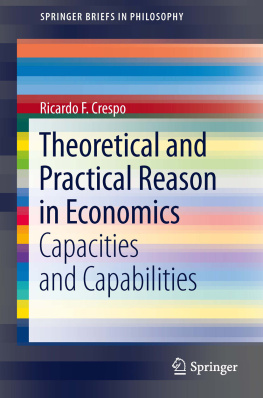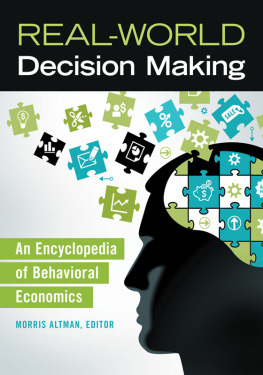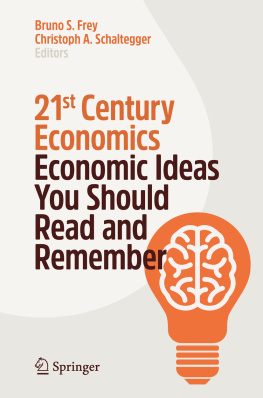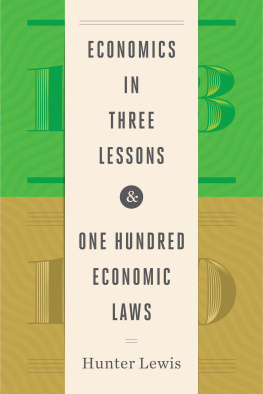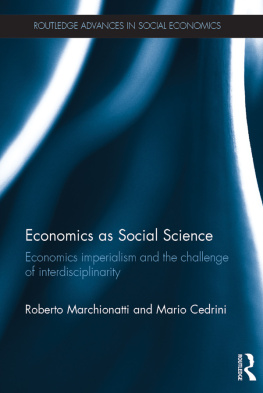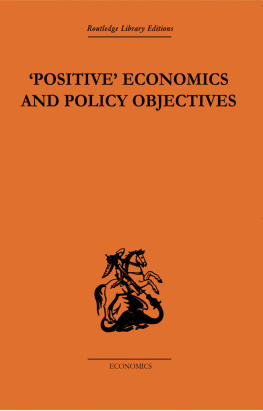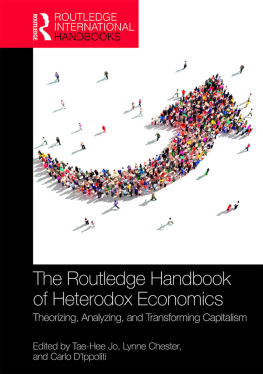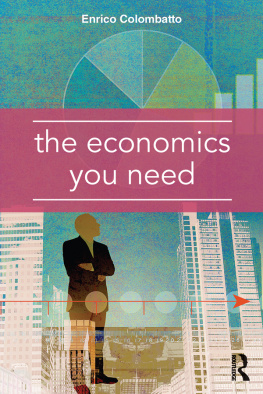Economics and Other Disciplines
During the second half of the twentieth century, economics exported its logic utility maximization to the analysis of several human activities or realities: a tendency that has been called economic imperialism. This book explores the concept termed by John Davis as reverse imperialism, whereby economics has been seen in recent years to have taken in elements from other disciplines.
Economics and Other Disciplines sheds light on the current state and possible future development of economics by focusing on it from a philosophical perspective, broadening the concept of rationality in economic theory. The beliefs that prevail in the world today make up a physicalist worldview. This book argues that this pervasive view is harmful for economics as a social science. Do new economic currents like behavioral economics, evolutionary economics, neuroeconomics, institutional economics, happiness economics, the capability approach and civil economy, escape this widespread mentality? What would be an adequate underlying economic ethos? Do these approaches fit into this ethos?
Ricardo F. Crespo appraises the contributions from a classical philosophy angle, emphasizing their implications regarding practical reason. This volume is of great importance to those who are interested in political economy, economic theory and philosophy, as well as philosophy of social science.
Ricardo F. Crespo is Professor of Philosophy of Economics in IAE (Universidad Austral) and in Universidad Nacional de Cuyo, Argentina. He is a researcher at the National Council of Scientific Research (CONICET, Argentina) and has published extensively in his field.
Routledge Advances in Social Economics
Edited by John B. Davis, Marquette University
This series presents new advances and developments in social economics thinking on a variety of subjects that concern the link between social values and economics. Need, justice and equity, gender, cooperation, work poverty, the environment, class, institutions, public policy and methodology are some of the most important themes. Among the orientations of the authors are social economist, institutionalist, humanist, solidarist, cooperatist, radical and Marxist, feminist, post-Keynesian, behaviouralist, and environmentalist. The series offers new contributions from todays most foremost thinkers on the social character of the economy.
Publishes in conjunction with the Association of Social Economics.
For a full list of titles in this series, please visit www.routledge.com/Routledge-Advances-in-Social-Economics/book-series/SE0071
20. Social Capital and Economics
Social values, power and social identity
Edited by Asimina Christoforou and John B. Davis
21. The Economics of Values-Based Organizations
An Introduction
Luigino Bruni and Alessandra Smerilli
22. The Economics of Resource-Allocation in Healthcare
Cost-Utility, Social Value and Fairness
Andrea Klonschinski
23. Economics as Social Science
Economics imperialism and the challenge of interdisciplinary
Roberto Marchionatti and Mario Cedrini
24. Health Care Economics
John B. Davis and Robert McMaster
25. Economics and Other Disciplines
Assessing New Economic Currents
Ricardo F. Crespo
Economics and Other Disciplines
Assessing New Economic Currents
Ricardo F. Crespo

First published 2017
by Routledge
2 Park Square, Milton Park, Abingdon, Oxon OX14 4RN
and by Routledge
711 Third Avenue, New York, NY 10017
Routledge is an imprint of the Taylor & Francis Group, an informa business
2017 Ricardo F. Crespo
The right of Ricardo F. Crespo to be identified as author of this work has been asserted by him in accordance with sections 77 and 78 of the Copyright, Designs and Patents Act 1988.
All rights reserved. No part of this book may be reprinted or reproduced or utilised in any form or by any electronic, mechanical, or other means, now known or hereafter invented, including photocopying and recording, or in any information storage or retrieval system, without permission in writing from the publishers.
Trademark notice: Product or corporate names may be trademarks or registered trademarks, and are used only for identification and explanation without intent to infringe.
British Library Cataloguing in Publication Data
A catalogue record for this book is available from the British Library
Library of Congress Cataloging-in-Publication Data
Names: Crespo, Ricardo F., author.
Title: Economics and other disciplines : assessing new economic currents / Ricardo F. Crespo.
Description: 1 Edition. | New York : Routledge, 2017. | Includes index.
Identifiers: LCCN 2017000639 | ISBN 9781138642447 (hardback) | ISBN 9781315629971 (ebook)
Subjects: LCSH: Economics--Philosophy. | Evolutionary economics. | Institutional economics.
Classification: LCC HB72 .C737 2017 | DDC 330--dc23
LC record available at https://lccn.loc.gov/2017000639
ISBN: 978-1-138-64244-7 (hbk)
ISBN: 978-1-315-62997-1 (ebk)
In this book Ricardo F. Crespo has asked questions and raised issues that have gone largely neglected in economics despite their fundamental importance to future development. He suggests economics is in the midst of a change in character and its possible future direction driven by the influences of other disciplines and also changes from within economics. His view is that heretofore economics has traveled into a cul-de-sac brought about by its commitment to a form of rationality that is determinist and makes choice illusory. Modeling itself on the natural sciences, economics has essentially eliminated freedom from its understanding of behavior, and the question this produces at this point in its historical development is: will the influence of other disciplines on economics a reverse imperialism and change from within economics redirect economics in such a way as to give freedom a role in explanations of economic behavior?
He labels his vision of economics as a non-determinist social science as liberal naturalism. His focus is the nature of rationality, and his argument is that the standard view of rationality in economics, the instrumental rationality of means and given ends, falls well short of and should be encompassed within a broader, classical view of rationality as practical reason, in which people think not only in terms of means but also about their ends indeed, they always think in terms of the relationship between means and ends. Instrumental rationality is a mechanical rationality, and optimization is the expression of a deterministic account of behavior in which people behave according to natural laws, a conception labeled restrictive or scientific naturalism.
Needless to say, postwar economics has only deepened and strengthened its commitment to instrumental rationality. But more recently it has drawn increasingly on other disciplines in ways that may affect its existing direction. At the same time, the influences of other disciplines on economics are varied, some implicitly sharing a scientific naturalist worldview and some more compatible with a liberal naturalism. So these influences, including how changes from within are influencing economics, place economics at a crossroads regarding the way in which it will develop. Ricardo accordingly assesses the new currents within economics from this vantage point. The great contribution of the book is that it develops and explains how practical reason ought to be the benchmark by which economics marks its future progress. The book will be a success if it puts this issue on the agenda in economics. I am optimistic that economics will ultimately adopt this more expansive vision of its domain, and happy to see this thoughtful reflection appears at this important time in economics on-going development.


